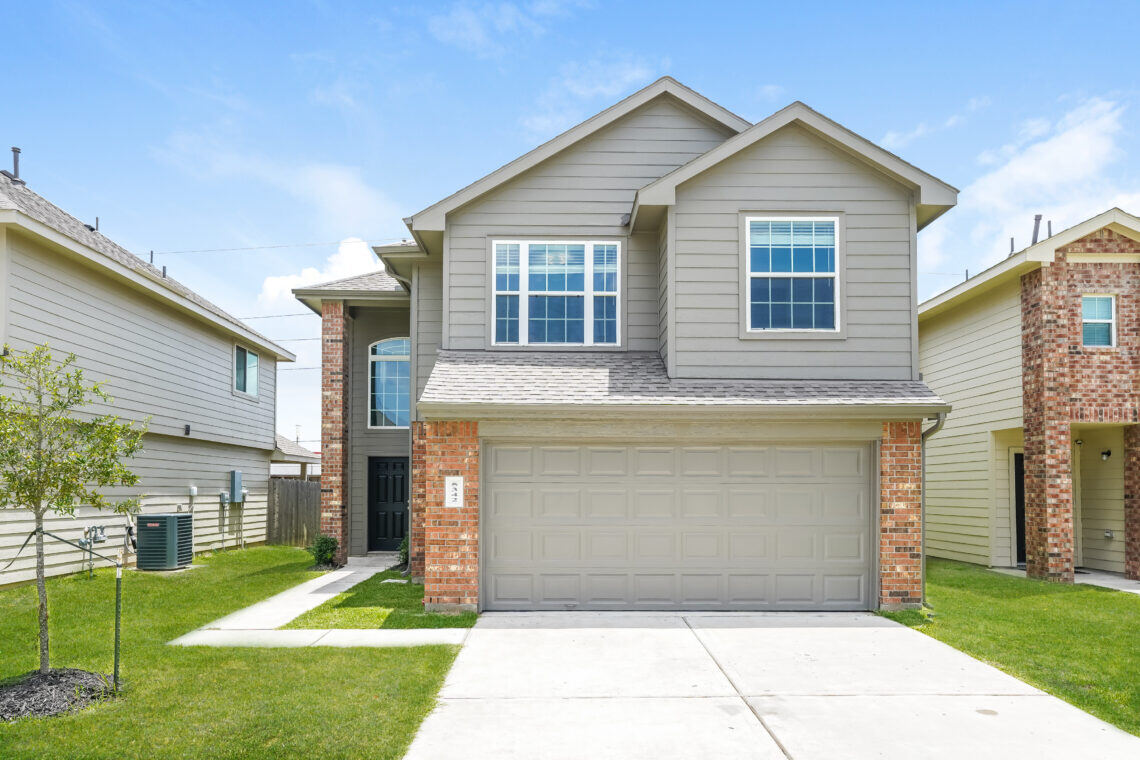A common question is, “Should I rent a house or rent an apartment?” While there is no correct answer to the question itself, there is a right answer for what will work best for you at this point in your life. Before you take the leap to rent a house or an apartment, there are many advantages and disadvantages to consider, whether you are a first-time or experienced renter.
What are the Pros and Cons of Renting a House vs. an Apartment?
Deciding to rent a house or an apartment is a big one. With everything to consider, you might be overwhelmed, wondering if it’s better to rent a house or an apartment. Below is a breakdown of some of the pros and cons of renting either type of dwelling.
Pros of Renting a House
- Privacy – In a single-family house, you have more privacy and space from your neighbors than in an apartment, with your own garage, front entrance, backyard and more.
- Maintenance Assistance – Renting a home might seem overwhelming but many property management companies offer maintenance assistance with big fixes such as roofs, electrical, plumbing, fencing, irrigation systems and more! Maintaining a rental home is much easier and affordable than you might expect.
- Space – Generally, single-family houses provide more room to move around whether you’re in your gameroom upstairs or a backyard with a private fenced yard. This space is desirable for many with growing families, larger pets, or numerous pets.
- Noisier Hobbies – Those who play instruments as a profession or hobby, as well as those who enjoy construction hobbies, will benefit from the space a single-family home offers as opposed to an apartment.
- Yard – If you have one or more pets, you will likely want a yard. Or maybe you’re an avid entertainer who dreams of backyard BBQs with friends and family. Having a yard gives you so many opportunities to enjoy the outdoors in the privacy of our own home.
- Family Planning – For those with a larger family in desperate need of space, or those looking to grow their families, a house can give you all the room you are looking for without the risk of noisy neighbors waking the children.
- Lifestyle – Whether you’re wanting to rent a home inside the city or move to a family-friendly suburb, there are rental homes to meet your needs and budget. Don’t compromise space and freedom if that’s what you desire.
Cons of Renting a House
- Convenience – If you’re looking for a home with a large yard, you may find yourself living further outside the city. Naturally, this means you are more reliant on your own transportation to go to events, restaurants, work, grocery stores, etc. which can increase gas and car insurance costs.
- Cleaning More Space – Houses have more rooms to clean versus apartments.
- Yard Work – Depending on your lease and landlord, you may have to keep the yard tidy. However, you can ask your property management company about their lawn maintenance package when inquiring about a rental home, as this can impact your monthly costs.
- Utility Costs – Many apartments have utilities worked into the rent, or the apartment is small enough that utility bills are minimal. However, houses have more space to heat, cool, illuminated, etc., leading to higher utility bills.
- Landlords – Finding a reputable property management or rental company is crucial. This will help ensure your maintenance requests, monthly payments, and general rental needs are met in a timely and professional manner.
- Flexibility – Depending on your rental company, home rentals can require lengthy leases, often from 12-18 months, while apartment leases often have month-to-month or 6-month leases available. This can play a role if you’re looking for a shorter lease.
Pros of Renting an Apartment
- Convenience – Living in an apartment often puts you close to grocery stores, entertainment, restaurants, and work. In addition, included amenities such as a fitness center will save you from additional expenses with outside memberships.
- Cost – While it depends on the apartment type and location, there are typically fewer upfront costs, as well as hidden or unexpected costs, associated with an apartment.
- Walkability – Apartments are often in locations where walkability is available. This means you can park your vehicle, relying more on walking and affordable public transportation, saving you on gas and parking fees.
- Lease Flexibility – There is more lease flexibility with apartments, particularly if you’re aware of your renting timeframe.
- Maintenance – When it comes to apartment living, maintenance typically handles maintenance requests quickly and efficiently since a maintenance problem for you can quickly impact more residents in the building. Additionally, all maintenance is included in most apartment leases.
- Utility Costs – Having less space and/or having utilities built into rent saves you money. Many apartment buildings and complexes come equipped with appliances and regular upkeep and maintenance that will inevitably help keep utilities lower.
- Lifestyle – For those who like to be close to their favorite activities, restaurants, and entertainment, apartment living keeps you close to it all, as well as gives you an immediate sense of community with neighbors just outside your door.
Cons of Renting an Apartment
- Lack of Privacy – You are likely to be sharing multiple walls in an apartment. This can impact your freedom to do things but also might leave you wanting a more quiet neighbor in the middle of the night. You will also be without a backyard and private entrance for your safety and enjoyment.
- Pets – Your apartment may have a weight or breed restriction on pets. These restrictions are less common for single-family rental houses and rental townhomes.
- Subletting – If you want to sublet, almost every apartment has in the lease that tenants are not allowed to sublet for any reason.
- Sound – From noisy neighbors to street traffic, apartment living has more noise on average than a single-family home with more space.
- Space – You may own more items than will fit in your apartment and must decide on how to store your extra belongings. This could mean a storage unit which equals additional costs.
- Restrictions – Apartment renters face more restrictions over how to use the space, including decor updates, balcony furniture or grills, home improvements, as well as desired appliances or fixtures. These restrictions can make it difficult to make the space feel like home.
- Parking – The parking situation around your apartment may prove to be unsafe or undesirable with large parking garages, lack of guest parking, and the overall increased risk associated with street parking or dark parking garages.
Before making a decision based solely on the list above, consider the pros and cons of what you require for your rental house or apartment and weigh their importance. Your budget, your location, your family and more will all play a role in your ultimate decision.
What are the Costs Associated with Renting a House vs. an Apartment?
The overall costs of renting a house versus an apartment may not differ as much as you may think. Typically, both require you to pay for such things as heating, cooling, electricity, water, renter’s insurance, security deposits, moving costs, etc. However, there will be some unaccounted-for costs with either option.
Costs of Renting an Apartment
Depending on your needs, the monthly costs of your apartment fluctuates, but less so than a house. The location of your apartment can be an added cost whether you live directly in the city center or further away. Naturally, if you opt for an amenity-rich or luxury complex, your rent will increase. If you don’t have furniture and do not rent a fully-furnished apartment, you’ll have to spend additional money on furniture. Your internet and/or cable package price depends on your area. Some apartments have exclusive deals with certain providers, prohibiting you from shopping around for a potentially less expensive provider. Many rental companies require that every renter has rental insurance. These are just a few of the extra costs of apartment rentals.
Costs of Renting a House
When you rent a house, you already know the highest monthly cost is heating and cooling your larger space. Depending on your rental agreement, you may also be left to take care of the lawn, whether you hire professionals or buy the equipment to maintain the lawn yourself. While internet and/or cable is another expense, you will likely be able to shop around for one that works best for you and your budget. Many homes are further from city centers, costing you more in daily transportation. If you are renting a newly-built home, you may have fewer maintenance expenses and lower utility costs per month than with older homes.
Is it Cheaper to Rent a House or an Apartment?
If you are working with a limited budget, renting an apartment will likely be cheaper. While the price of rent depends on where you choose to live within your city, many apartments roll in the costs of utilities or internet and cable into what you pay per month. With a house, you tend to have more flexibility in choosing providers for many household needs.
Apartment amenities can make renting an apartment more affordable since they can cut back on activities you pay to do, such as gym memberships. If you find a fully-furnished apartment, you don’t even have to worry about the cost of additional furniture, though your rent will increase, which you will not find with rental homes.
In the end, it depends on your lifestyle and personal preferences as to whether renting an apartment or single-family home is best.
How does my credit score affect renting a home or apartment?
When you put your finances in order as you prepare to put in your rental application, it’s easier to know your chances of getting the rental you are paying for if you know your credit score. The landlord, whether for an apartment or house, will potentially run a background check, verify your employment, and check your credit. Your credit report is important since your landlord wants to know about your ability to pay rent reliably.
Your credit score is especially important if you are a first-time renter. Generally, landlords want a guarantor to sign the lease with the first-time renter. A guarantor is a person who co-signs the lease with the tenant guaranteeing to pay the rent if the tenant does not. Not all first-time renters can find a guarantor. So having a strong credit score and proving savings can convince a landlord to waive a guarantor for the lease.
Where can I find a rental home?
Now that you’ve figured out if it is better to rent a house or an apartment depending on your wants and needs, it’s time to figure out where you can find a place to rent. If an apartment is what you’re after, it’s easy to drive around your city and see what is out there or try an online search. If you are looking to rent a home in Houston, San Antonio, Dallas-Fort Worth, or Bryan/College Station, SimplyHome, formerly Camillo Properties, can help you find the ideal single-family rental home or townhome for you.






